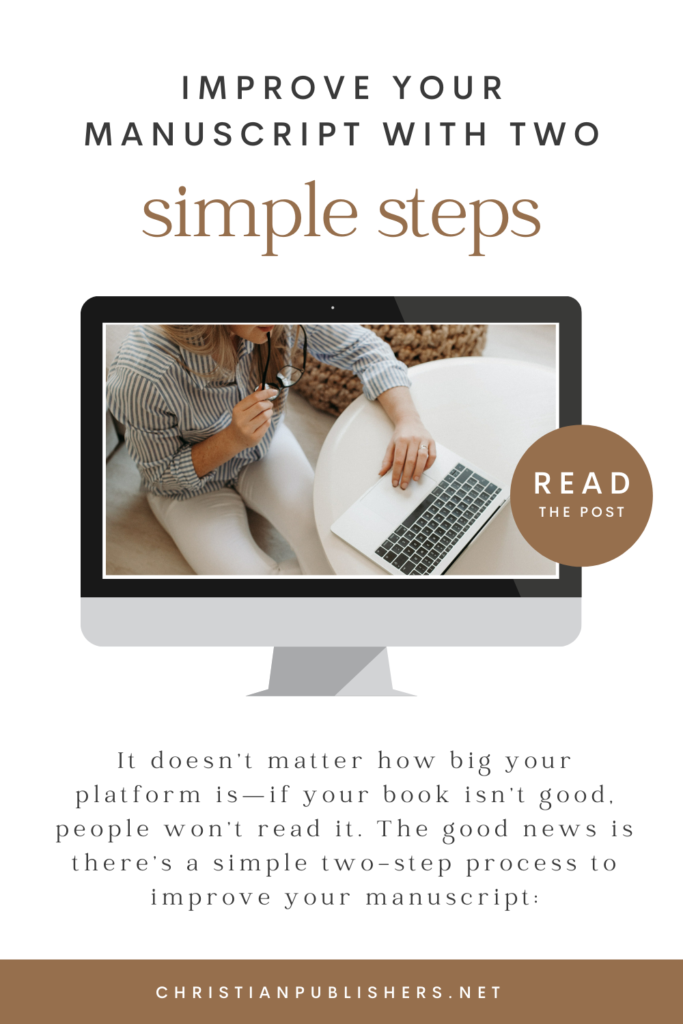
Improve Your Manuscript With Two Simple Steps
It doesn’t matter how big your platform is—if your book isn’t good, people won’t read it. The good news for indie authors is there’s a simple two-step process to improve your manuscript:
- Hire a book editor.
- Listen to your book editor.
That may sound silly and obvious, but after more than a decade of editing books, judging manuscript contests, and working with new authors (traditional and self-published authors), I can assure you that many authors skip these steps and it shows.
When you publish traditionally, the publisher provides several rounds of editing. As an indie author, however, all the responsibility falls on your shoulders, so it’s critical that you hire an editor before you publish.
Why Do I Need a Book Editor?
When you look at the most common mistakes indie authors make, a good book editor can (and should) help with more than just “editing” (grammar, punctuation, spelling, etc.). A good book editor can help you organize your manuscript, tweak your title, and correctly identify your genre, among other things.
Before you hire an editor, however, it’s important to identify the type of edit you desire.
What Type of Editor Do I Need?
Before you can identify which edit you need, you need to know which types of edits are available. There are three main types of book edits:
- Substantive editing: “big picture” edits that look at organization, structure, flow, readability, etc. In fiction, they also look at characterization, plot structures, and other fiction-specific things.
- Copy editing: Grammar Nazi edits that correct punctuation, grammar, word usage, formatting, citations, end/footnotes, etc. (This round of edits should remind you of high school English class.)
- Proofreading: not technically an edit, a proofread is more of a review. All of the major issues should be cleaned up in either the substantive or copy editing rounds. Proofreading is more or less looking for any mistakes that slipped past the first editors.

Which edit do you need?
In my experience, new authors need to start with a substantive edit. By “new,” I mean anyone working on their first manuscript (or second or third), as well as anyone working on a manuscript in a new genre (if you’ve published six novels and are working on a devotional, you need a substantive editor). If you’ve written a few manuscripts and are confident in your organization and content, hire a copy editor. The only time to hire a proofreader is after you’ve hired a copy editor.
If you’re not sure which type of edit you need, ask an editor. Some may charge for an assessment, but many will provide a free review of your work to let you know which type of edit would be best.
Once you know what type of edit you need, it’s time to find the right book editor for you.
How Do I Find the Right Editor?
There are two main factors to consider when hiring a book editor:
- Does this person know what he/she is doing?
- Can I work with this person?
The first factor looks at an editor’s skills. Just because a person calls himself an editor doesn’t mean he can do the work you need (literally anyone with internet access can create a website and call himself a book editor). Here are a few things to consider and ask about before you hire an editor:
- Genre (especially important for substantive edits): each genre has its own set of guidelines and expectations. An experienced novel editor is not necessarily the right person for a Christian living self-help book. Make sure your editor works in your genre.
- Experience: whether working freelance or for a publisher, ask what the editor has worked on. Read samples if possible. (DISCLAIMER: freelance editors working with indie authors have no control over the final project, so the author may not take their suggestions. If that happens, the editor may not have samples for you to read.)
- Connections: while not necessarily indicative of the editor’s ability, professional memberships and associations often speak to an editor’s professionalism and training. The Editorial Freelancers Association, Christian Proofreaders and Editors Network, and ACES: The Society for Editing are all reputable organizations that many editors join. Editors are also known to attend writer’s conferences to help them stay on top of industry standards; ask if they’ve attended any recently.
- Cost: The Editorial Freelancers Association’s website includes a list of average rates for different editing services. If you need a substantive edit but can’t afford one, start saving. If you find an editor willing to do the work for a fraction of the cost, chances are good you’ll be getting a fraction of the edit. A good editor is worth the investment.
- For substantive sample edits: many substantive editors will provide either a free sample edit (usually the first 2–3 pages) or a reduced-price sample edit. Don’t be afraid to ask about it. A sample edit will give you a chance to review the editor’s work and compare it with other editors. It also helps you in the second phase of hiring the right editor…
Can I work with this person?
When you hire an editor, you’re essentially asking someone to tell you how ugly your baby is. You’ve worked on your manuscript for months (or years!), and a book editor is going to point out all of your mistakes. Reviewing your edits is going to be tough, so it’s important to find an editor you connect with and trust.
Every editor has his/her own style and personality, and that comes through in the edits. I’m not a nurturing person, so I don’t work well with people who need a lot of positive reinforcement. I love fiction (especially women’s fiction and romance), so I’m a great candidate for someone with a contemporary romance manuscript (I read, write, and edit the genre regularly).
It’s important to do your research before hiring an editor because you will be working with that person for weeks or months. Ask questions to see if your personalities mesh well. Talk to past clients to find out about their experiences. Find the editor online to see if his/her social media posts and website present the type of person you want to associate and work with. (For authors needing a substantive editor, the sample edit gives you a first-hand look at all of this.)
Don’t hire someone just because another author did. The author/editor relationship is a personal one, so it’s important to make sure the chemistry and communication works for you.
At this point, you’ve done most of the work. You’ve figured out which edit you need, researched editors, talked to them, and (hopefully!) hired someone to help you polish your manuscript. All of this work leads up to the most important part of improving your manuscript…
Listen to Your Book Editor!
It’s not enough to hire a book editor—you need to listen to what they say!
Several years ago, an author hired me to edit her manuscript. It was the first book of a series and an agent was interested, but the agent said the manuscript needed an edit before he’d consider it. The author hired me, then argued with me about everything. When I questioned character motivations, she assured me they were fine. When I pointed out inconsistencies, she said her audience would understand. When I suggested some material wouldn’t be appropriate for her audience, she said she liked it and wanted to keep it.
In the end, I think the author made 10–15 percent of my suggested changes. Then she told the agent the book had been edited and resubmitted. The agent passed. Other agents passed. The book is still unpublished.
I understand there are some bad editors out there. They offer services or take on genres they don’t understand. They mismanage their time and miss deadlines. They don’t communicate well.
However, if you do the necessary work first (the research we’ve talked about), there’s no reason not to trust your editor. At this point in the process, you should know your editor and his work well enough to know that you can trust the suggestions and corrections he gives you. If you don’t understand a comment, ask, but don’t ignore it just because you don’t like it or understand it—if it’s on the manuscript, it’s there for a reason.
Remember: an editor’s job is to help you produce the cleanest, strongest manuscript possible. As long as you’ve done the work of finding the right editor for your project, you can trust that editor’s expertise and guidance.
About the Author
Owner of Write Now Editing, Karin Beery turns good manuscripts into outstanding books. She also edits for Iron Stream Media and is an active member of the Christian Editor Network. When not editing, she writes hopeful fiction with a healthy dose of romance.




